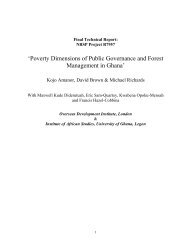The Gambian Tourist Value Chain and Prospects for Pro-Poor Tourism
The Gambian Tourist Value Chain and Prospects for Pro-Poor Tourism
The Gambian Tourist Value Chain and Prospects for Pro-Poor Tourism
Create successful ePaper yourself
Turn your PDF publications into a flip-book with our unique Google optimized e-Paper software.
<strong>Tourism</strong> in <strong>The</strong> Gambia: International ‘Best Practice’ in Poverty Reduction & <strong>Pro</strong>-<strong>Poor</strong> Growth Through <strong>Tourism</strong><br />
Draft Report (Friday 22 nd December 2006)<br />
Table 2: Five Empirical Studies on the Impact of <strong>Tourism</strong> on Developing Countries<br />
Where How Findings<br />
Mauritius,<br />
South<br />
Africa &<br />
Zimbabwe<br />
Egypt<br />
Tanzania<br />
14<br />
‘tourism<br />
countries’<br />
Indonesia<br />
Quantitative<br />
empirical<br />
desk-top<br />
analysis<br />
Inputoutput<br />
model<br />
General<br />
Equilibrium<br />
Model<br />
Crosscountry<br />
regression<br />
General<br />
equilibrium<br />
model<br />
<strong>Tourism</strong> is well-linked into the local economy <strong>and</strong> is overwhelmingly locallyowned,<br />
directed <strong>and</strong> controlled. <strong>Tourism</strong> has an industrial structure similar<br />
to non-tourism goods <strong>and</strong> services. It has low barriers to entry, is not import<br />
intensive <strong>and</strong> has a pro-poor impact 16 .<br />
Impact of international tourism on jobs <strong>and</strong> economic activity is much<br />
greater than suggested in national accounts – as this focuses only on the<br />
minority (i.e. 30-40%) of tourist expenditure that takes place in hotels <strong>and</strong><br />
restaurants. Direct tourism jobs constitute 5.7% of national employment –<br />
<strong>and</strong> 12.6% if indirect <strong>and</strong> induced jobs are included. <strong>Tourism</strong> contributes<br />
over 10% to national GDP 17 .<br />
<strong>Tourism</strong> has a substantial positive impact on GDP, total welfare, exports <strong>and</strong><br />
tax revenue. Urban areas will benefit more from tourism expansion than<br />
rural areas unless government invests in improving infrastructure – under<br />
this scenario the distributional impact of tourism expansion<br />
disproportionately benefits the rural areas.<br />
<strong>The</strong> economic per<strong>for</strong>mance of the ‘tourism countries’ (i.e. the national<br />
economies most heavily dependent on tourism in the world) exceeded the<br />
total sample of 143 countries without a tourism specialisation in all<br />
categories (OECD, Oil exporters, developing countries, etc from 1980 to<br />
1995. <strong>Tourism</strong> specialisation appears to be an independent determinant of<br />
dynamic growth – which cannot be explained by conventional theory<br />
regarding countries saving / investment propensities, openness to trade, or<br />
starting from a poorer base 18 .<br />
Examined the impact of globalisation (in the <strong>for</strong>m of tariff reductions) as a<br />
st<strong>and</strong>-alone policy <strong>and</strong> in conjunction with tourism growth. <strong>Tourism</strong> growth<br />
amplifies the positive impacts of globalisation on production <strong>and</strong> welfare.<br />
<strong>Tourism</strong> receipts mitigate the adverse effects of globalisations – particularly<br />
the government deficit <strong>and</strong> trade balance 19<br />
<strong>Tourism</strong> is not a panacea <strong>for</strong> pro-poor development in the South, nor is tourism equally<br />
appropriate <strong>for</strong> all countries. However, on the basis of this analysis, there are reasonable<br />
grounds <strong>for</strong> hypothesising at the macroeconomic level that tourism generally has a benign<br />
developmental impact on host countries 20 .<br />
2.3 A Framework <strong>for</strong> Analysing <strong>Pro</strong>-<strong>Poor</strong> <strong>Tourism</strong><br />
Annex D includes a detailed outline of our framework <strong>for</strong> analysing pro-poor tourismtogether<br />
with examples of international ‘best’ <strong>and</strong> ‘worst’ practice. This short section<br />
simply introduces the skeleton of the framework to help guide the reader through the<br />
detailed empirical work from <strong>The</strong> Gambia. We have drawn many of the practical examples<br />
of what works <strong>and</strong> does not work from the Annex into the text to encourage a comparative<br />
perspective to the analysis of tourism in <strong>The</strong> Gambia.<br />
16 Page, S (1999) <strong>Tourism</strong> <strong>and</strong> development: <strong>The</strong> evidence from Mauritius, South Africa <strong>and</strong> Zimbabwe<br />
Internal ODI Working Paper, ODI, London, UK<br />
17 Tonamy, S <strong>and</strong> Swinscoe A (2000) <strong>The</strong> Economic Impact of <strong>Tourism</strong> in Egypt Working Paper No.40<br />
18 Brau, R; Lanza, A <strong>and</strong> Pigliaru, F (2003) How Fast are the <strong>Tourism</strong> Countries Growing? <strong>The</strong> cross country<br />
evidence Presented at the <strong>Tourism</strong> <strong>and</strong> Sustainable Economic Development Conference 19-20 th September<br />
2003, Sardinia, Italy<br />
19 Sugiyarto, G; Blake, A <strong>and</strong> Sinclair, MT (2002) Economic Impact of <strong>Tourism</strong> <strong>and</strong> Globalisation in Indonesia<br />
Christel DeHaan <strong>Tourism</strong> <strong>and</strong> Travel Research Institute, Nottingham University Business School, UK<br />
20 Mitchell, J & Ashley, C (2006) Can tourism help reduce poverty in Africa? ODI Briefing Paper<br />
12

















